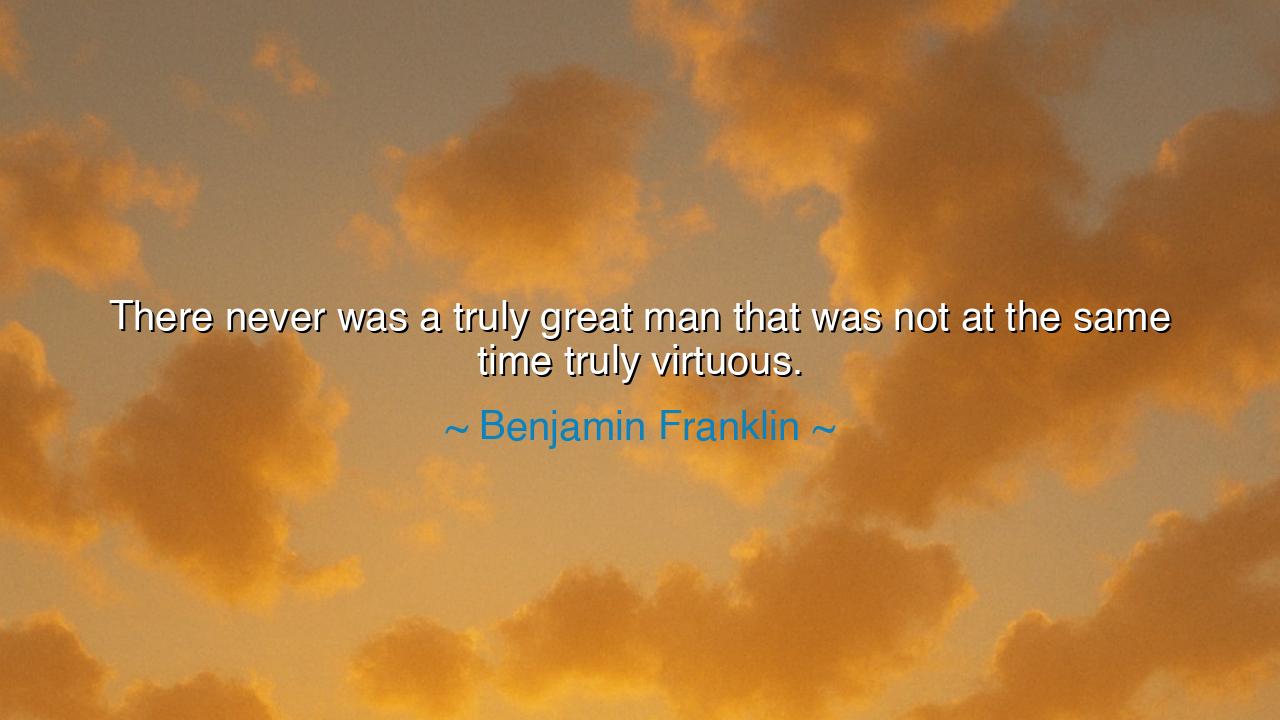
There never was a truly great man that was not at the same time






“There never was a truly great man that was not at the same time truly virtuous.” — Benjamin Franklin
In this noble declaration, Benjamin Franklin, one of the wisest architects of the new world, reveals the eternal bond between greatness and virtue. He speaks not merely as a philosopher or statesman, but as a man who understood the delicate harmony between power and morality. To Franklin, greatness without virtue was a shadow without substance—a brilliance that dazzles for a moment, then fades into ruin. His words echo the ancient wisdom of Greece and Rome, of sages and prophets before him: that no man can be truly great in the eyes of time or Heaven unless he is also good in spirit.
Franklin’s life was proof of his own belief. Rising from humble beginnings, he mastered the art of self-discipline and civic duty. He sought knowledge not for vanity, but for service. His inventions, his writings, his diplomacy—all were guided by a moral compass fixed on virtue. He once wrote a list of thirteen virtues—temperance, humility, industry, sincerity, justice among them—and devoted his life to perfecting them. Through this practice, he became not only a leader of men, but an example to generations. His greatness, therefore, was not built on conquest or wealth, but on character—the quiet strength of a man who ruled himself before seeking to guide others.
The ancients would have recognized Franklin’s truth. Aristotle taught that virtue is the essence of human excellence, and that greatness cannot exist without moral integrity. The Romans too held this creed: they honored virtus, not as mere virtue, but as the very heart of heroism—the courage to act rightly in all things. Those who lacked virtue, no matter their victories, were condemned as hollow, their greatness illusory. History bears witness: Alexander conquered the world, but in losing mastery over his own passions, he fell to excess and despair. His glory, though bright, was fleeting. But Marcus Aurelius, who governed with wisdom and restraint, remains remembered not for his armies, but for his virtue, the emperor who ruled himself before ruling Rome.
Franklin’s quote arises from this timeless lineage of thought. In his age—the age of Enlightenment—men spoke often of progress, science, and liberty, yet Franklin saw that without virtue, all progress collapses into chaos. For virtue is the foundation of freedom; it is what keeps power from becoming tyranny, and ambition from becoming corruption. The truly great man, Franklin says, is not one who dominates others, but one who uplifts them. Without virtue, talent becomes arrogance; without virtue, knowledge becomes deceit; without virtue, strength becomes cruelty. Thus, all greatness that endures must be rooted in the moral soil of goodness.
To see this truth in living form, one may look to the life of Abraham Lincoln. He was not the loudest, nor the most powerful, but he was steady, humble, and just. Through war and division, he never abandoned his conscience. His greatness was born not of conquest, but of compassion—the virtue of mercy even toward his enemies. His leadership healed a fractured nation and sanctified his memory forever. Such is the kind of greatness Franklin spoke of: the greatness that endures because it is bound to the eternal laws of right.
The lesson, then, is both simple and profound: character is the root of greatness. Do not seek power before purity, nor success before integrity. The truly great man or woman does not chase applause, for they serve a higher judge—their own conscience. If you wish to be great, begin by being virtuous. Master your impulses, speak truth, act with fairness, labor with diligence, and give without expectation. These are not small things—they are the pillars upon which all lasting greatness stands.
So, my child of the modern age, remember this truth as the ancients remembered the laws of the stars: that no crown, no fame, no achievement can make you great unless it is joined with virtue. Let your goodness be the flame that lights your path, and your greatness will come of itself, unbidden and enduring. For the world is full of clever men and powerful rulers, but only the virtuous are remembered as truly great.
And when your days draw to their close, may it be said of you what Franklin once knew to be the highest praise—that you were not only wise, or skilled, or strong, but truly good, and therefore, truly great.






AAdministratorAdministrator
Welcome, honored guests. Please leave a comment, we will respond soon